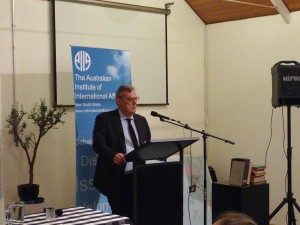China - the constrained superpower
At Glover Cottages on Tuesday 28 April, former Australian Ambassador to China Geoff Raby addressed AIIA NSW on the theme of China as a constrained super power. He said that China used to throw its weight around, especially under the Manchus. But historical precedents were no guide to its present situation or behaviour. China remained an empire with many unresolved internal problems. Its frontiers stretched for 22,000 kilometres bordering 14 countries. With very few of these did it feel comfortable. It shared little historical mutual trust with India and Russia. It continued reluctantly to mentor North Korea, but deeply feared the economic or political collapse of that regime, in which case millions of Koreans would flood into north-east China looking for food, and joining up with millions of ethnic Koreans already there. With Japan, territorial issues were deep and probably unresolvable. China had rapidly growing military capabilities, but every time it flexed its muscles, especially in South East Asia, it undermined its strategy of balancing and eventually supplanting the pervading regional military presence of the United States.
In any event, it was 20-30 years from eventually presenting the US with a serious military challenge. China also had had to come to terms with a profound change in its trade. For 3,000 years it had been self-sufficient, but with current rising standards of living, it had become the world’s single biggest importer. Resource and energy dependency were China’s greatest challenge. In this context, it was utterly dependent on keeping the Malacca Straits open for maritime trade, a massive strategic vulnerability. To combat this, China had a ‘one belt, one road’ strategy – the expansion of land and sea links around and through Asia to the west. It had two oil pipelines through Burma, which meant that for the first time in its history, it was not solely dependent on maritime oil imports. China’s Infrastructure Development Bank was part of this strategy, its first rules-based financial system. To this extent, and to the extent of the success of its plans to reduce its economic vulnerability, China was re-fashioning the international economic order.
Summary by Richard Broinowski
for an edited video of the event: https://youtu.be/L0UzRFiIYUA
